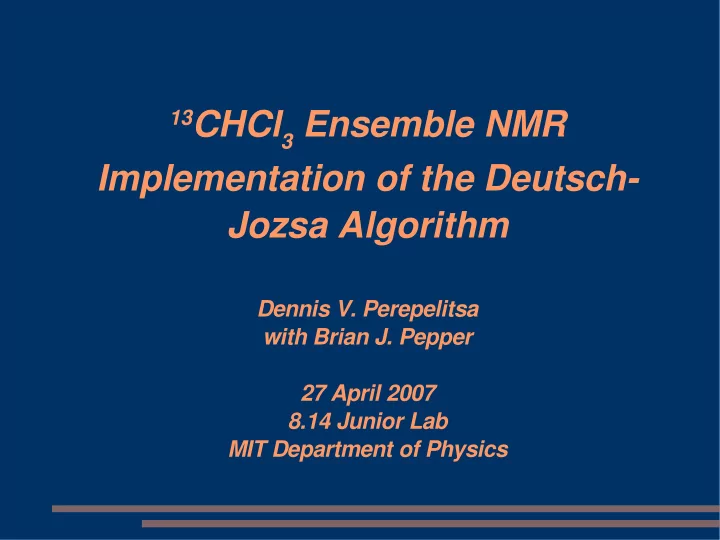

13 CHCl 3 Ensemble NMR Implementation of the Deutsch- Jozsa Algorithm Dennis V. Perepelitsa with Brian J. Pepper 27 April 2007 8.14 Junior Lab MIT Department of Physics
Outline of Talk 1. Introduction 2. Quantum Computation 3. Initial State Preparation 4. Deutsch-Jozsa Algorithm 5. Experimental Setup 6. Calibration 7. Experimental Results 8. Error Analysis 9. Conclusion ... Introduction DVP 4/27/2007
Introduction ● 1985: Feynman proposes quantum computation , characterizes quantum logic gates. ● 1985: Deutsch characterizes the universal quantum computer. ● 1992: Deutsch and Jozsa present an algorithm that requires less operations on a quantum computer. ● 1997: Gershenfeld and Chuang propose an implementation using bulk-ensemble spin systems. ● 1997: Cory, et. al. propose using NMR spectroscopy. ... Quantum Computation DVP 4/27/2007
Quantum Computation ● Key Idea #1: Every pair of spin eigenstates is a qubit. ● Key Idea #3: Implement a function f with a unitary operator U f . ● Key Idea #2: Operations are implemented with RF pulses. ● Important example: controlled-not. Implements f(x) = x . ● Ensemble NMR --> measure expectation values. ... Initial State Preparation DVP 4/27/2007
Initial State Preparation The Boltzmann distribution of the energy eigenspectrum is Problem: We need the pure state |00> ! Solution: Time-average to obtain a pseudopure state . ● Take three trials, cyclically permuting the non-|00> elements. ● The average of the three is the action on the pure state |00> ! ● Finally, fire a “read out” pulse and observe the FID signal. Density matrix leads to spectrum ... Deutsch-Jozsa Algorithm DVP 4/27/2007
Deutsch-Jozsa Algorithm (1992) ● Classically: Look at both sides to decide if a coin is fair. (2 evaluations) ● Quantum computation can do better! ● Enumerate (and implement) all possible functions: ● Apply pulse sequence to |00> ● If f(0) = f(1): We see |00> ● If f(0) != f(1): W e see |10> ... Experimental Setup DVP 4/27/2007
Experimental Setup (Heavily modified from 8.14 Quantum Information Processing lab guide ) ... Calibration DVP 4/27/2007
Calibration ( xkcd.com – used under the Creative Commons License 2.5 ) ... Calibration (cont) DVP 4/27/2007
Calibration Fourier transform into frequency domain. ... Calibration (cont) DVP 4/27/2007
Calibration 180-T-90 pulse sequence to obtain T 1 Vary pulse width and measure net magnetization to find pw-90 ... Experimental Results (cont) DVP 4/27/2007
Experimental Results Calibration from the thermal state proton carbon Theoretical Prediction: U f1 , U f2 (6,0) (6,0) U f3 , U f4 (-6,0) (0,6) ... Experimental Results (cont) DVP 4/27/2007
Experimental Results U f1 U f2 ... Experimental Results (cont) DVP 4/27/2007
Experimental Results U f3 U f4 ... Error Analysis DVP 4/27/2007
Error Analysis ● Integrate absolute peaks numerically. ● Random error calculated from 20 repeated “baseline” spectra ~ 1% ● Uncertainty from fluctuations in the background ~ .5% ● Calibrate from thermal state, propagate error. But: ● Deviation from theoretical prediction typically ~10-20%. ● Our error does not cover this! Significant systematics: ● Asymmetric lineshapes due to improper shimming. ● Imperfect pulse widths – deterioration over time. ● Inhomogeneous magnetic field. ● Inhomogeneous RF field. ... Conclusion DVP 4/27/2007
Conclusion We have: ● Presented an implementation of Deutsch-Jozsa using ensemble NMR. ● Calibrated computing system. ● Successfully performed DJ on all four functions. ● Discussed sources of error. Stay tuned: ● Brian Pepper on Grover's Algorithm. Questions? DVP 4/27/2007
Recommend
More recommend